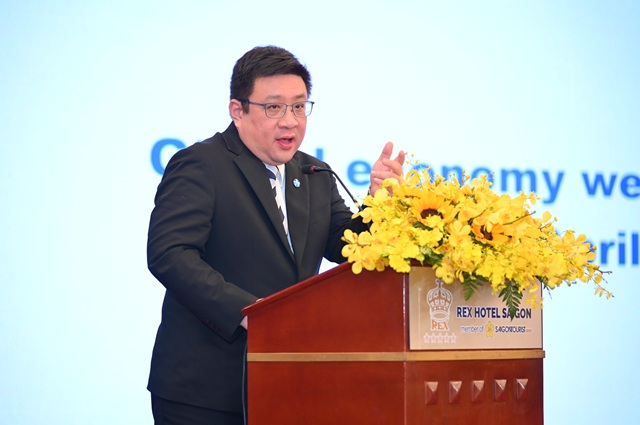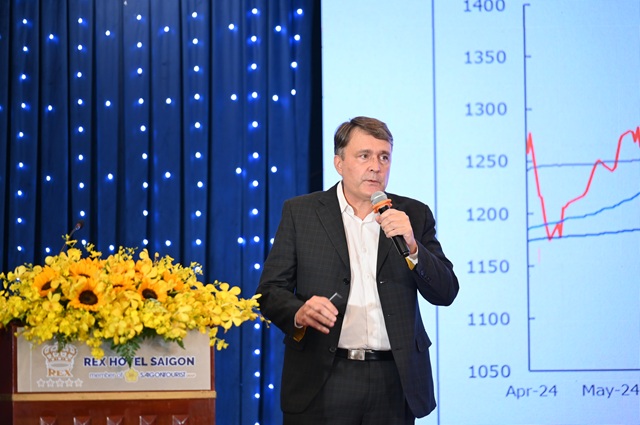
Yuanta Vietnam’s Seminar “From Asia to Vietnam” on the morning of 04/19/2025
|
Vietnam’s economy faces short-term instability but has long-term advantages.
In the short term (Q2 2025), Dr. Chen Hui Yen, Director of Analysis/Vice President of the Research Center, Yuanta Investment Consulting Securities (YIC), opined that Trump’s policies could cause short-term instability. However, she emphasized that Trump is willing to quickly adjust his policies if needed. The recent tariff retaliation in early April triggered two liquidity crises, disrupted global supply chains, and caused extreme volatility in financial markets.
Despite this, the tariff delay for most countries (except China) and the exemption for certain key consumer electronics have helped restore supply chains and market liquidity.
Although the liquidity issue has been resolved, these events are likely to distort the economic trajectory for 2025. With a 10% tariff floor and no guarantees beyond the 90-day exemption, manufacturers may stockpile inventory in Q2. As a result, Vietnam could see strong export growth in Q2 (except to China). However, once inventory levels are satisfactory, production and trade will normalize, leading to a potential reverse V-shaped economic cycle this year.
 Dr. Chen Hui Yen, Director of Analysis/Vice President of the Research Center, Yuanta Investment Consulting Securities (YIC)
|
In the medium term (second half of 2025), with tariffs of over 100% on China and 10% on other trading partners, global GDP growth could be adjusted downward by approximately 0.6 percentage points. China will be significantly impacted, with its economic growth potentially adjusted downward by about 2.5 percentage points. However, some countries outside of China, including the rest of Asia (including Vietnam), may benefit from trade diversion, with GDP growth potentially adjusted upward by around 0.7 percentage points. Dr. Yen believes that Vietnam’s overall economic outlook remains robust and vibrant.
However, she also noted that the Vietnamese stock market could face external “headwinds,” particularly from the US. The US stock market may face new pressures around July due to rising inflation and narrowing corporate profit margins. As the Vietnamese stock market is relatively young, a global downturn could spill over into Vietnam. Nonetheless, Dr. Yen is confident that the market will stabilize in the latter half of the year due to Trump’s logic, who may shift his focus from trade to tax cuts, boosting confidence.
Looking further ahead, from 2026 onwards, Dr. Yen opined that the long-term outlook for Vietnam’s economy is very favorable due to the global supply chain restructuring. He explained the “political trilemma” of the world economy, where national sovereignty and global integration (free trade) can conflict in Western democracies. Trump’s strategy aims to “restore” the international economic order that has been “eroded” by China’s participation and competition. The US reducing direct trade with China while maintaining “loopholes” will lead to Chinese goods being rerouted through other countries like Vietnam and Mexico before reaching the US. This increases Vietnam’s growth potential.
Vietnam is one of the highly integrated countries with China’s supply chain and stands to benefit from the first wave of trade diversion. Industries such as textiles, electronics, personal computers, furniture, machinery, and equipment will face the most significant supply chain restructuring pressure, creating opportunities for Vietnam. Therefore, Mr. Yen emphasized that Vietnam should seize this opportunity to proactively promote import substitution from China and upgrade its industry to become a proactive link in the new global supply chain.
The stock market will fluctuate until July
At the event, Mr. Matthew Smith, CFA, Director of Institutional Research and Analysis, Yuanta Securities Vietnam, shared his insights on the Vietnamese stock market. The Yuanta expert opined that the Vietnamese stock market has been relatively stable compared to other markets in the region and globally.
While the imposition of a 46% tax on Vietnam is negative news, Mr. Smith does not believe this will be the final outcome. He is optimistic due to the involvement of the US Treasury Secretary in trade negotiations. The tariff delay on April 9th helped the stock market recover.

Mr. Matthew Smith, CFA, Director of Institutional Research and Analysis, Yuanta Securities Vietnam
|
However, he advised investors to remain cautious and not panic. He predicted that the market would fluctuate within a certain range until July, when there could be new developments regarding tariffs. Mr. Smith highlighted that the good personal relationship between President Trump and Vietnam could be a positive factor in trade negotiations.
He believed that the second half of the year would be brighter for Vietnam. While FTSE did not upgrade Vietnam’s market in its recent announcement, a more positive announcement could come in October.
An upgrade by MSCI would be much more significant but could take a few years, possibly around 2027-2028, after Vietnam implements the KRX and CCP trading systems.
– 19:09 04/20/2025
Title: UOB: SBV May Cut Policy Rates to COVID-19 Lows if Economic Conditions Deteriorate, USD/VND Forecast to Rise to 27,200
According to UOB, the risk trend is tilting towards the SBV cutting interest rates, due to the downward pressure on business and exports, with the potential shock of the 46% tax from the US on the Vietnamese economy.
The Latest Credit Growth Figures: Unveiling the Banking System’s Performance
“The banking sector is off to a strong start this year, with credit growth outpacing that of the previous year. According to Vice Governor of the State Bank of Vietnam, Pham Thanh Ha, as of March 12, credit growth in the banking system had increased by 1.24% compared to the end of 2024, indicating a significant improvement.”
‘Money Flow into the Market is Not Fast Enough to Stimulate Growth’
“Domestic consumption and investment incentives currently contribute over 90% to GDP growth. With exports facing challenges, it is imperative to find solutions to stimulate and unleash these two drivers. However, as Dr. Can Van Luc, a renowned economist, points out, there is a prevailing issue of increasing money supply but slow velocity of money circulation. This results in a lag in the infusion of money into the market, hindering the desired growth trajectory.”
The Way Forward: Unlocking Breakthrough Solutions for Sustainable Development in the New Era
The year 2025 warrants a unique position, and the approach to crafting Vietnam’s economic scenario for that year must be viewed as a foundation for not just ensuring high growth for 2025 but also for sustaining that growth over the next 5 to 10 years and beyond.





















